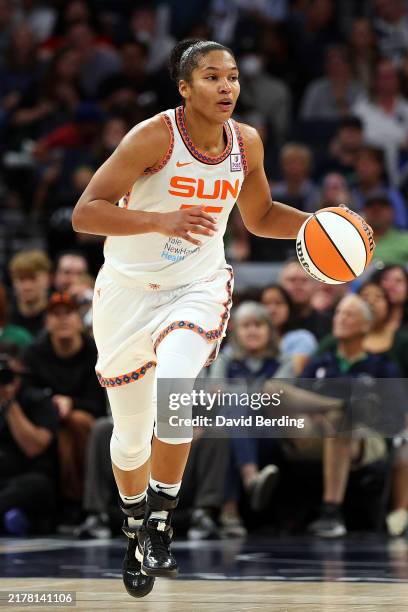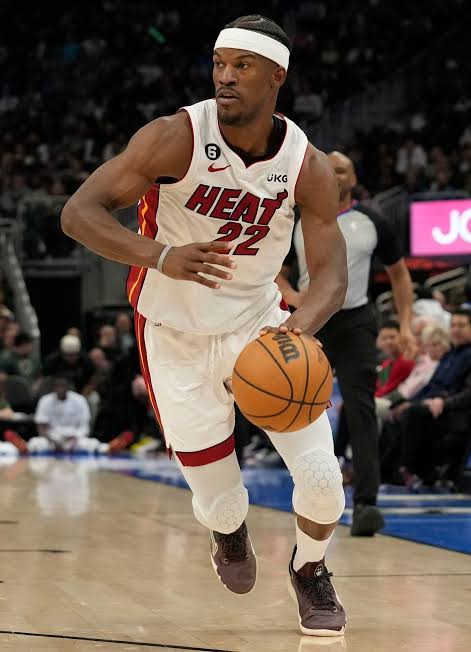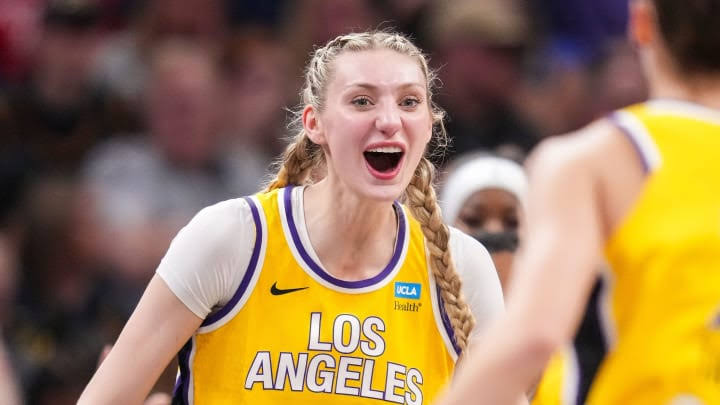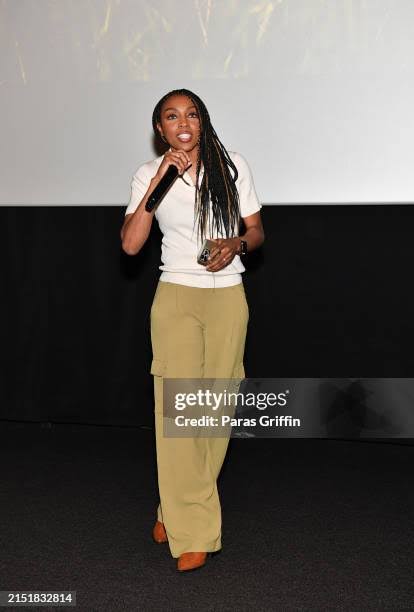Opinion
With more visibility comes more online harassment.
Connecticut Sun forward Alyssa Thomas (25) celebrates a basket while being fouled during the second half in Game 2 of a first-round WNBA basketball playoff series against the Indiana Fever, September 25, 2024, in Uncasville, Conn.
For Djaniele Taylor, attending WNBA games became a meaningful way to reconnect with her community after enduring pandemic-era lockdowns.
The 38-year-old from Evanston, Illinois, has been a loyal Chicago Sky fan since the team’s first championship win in 2021. As a queer Black woman, she found the games to be a welcoming, supportive environment.
“I was hooked and I loved the atmosphere — it was very queer-friendly, very family-oriented, very diverse,” she shared.
However, with the WNBA’s growing popularity, Taylor noticed a shift. Season ticket prices more than doubled since 2022, and what was once a positive and inclusive space occasionally turned hostile.
As women’s sports reach record-breaking levels of attendance and viewership, Taylor and other long-time fans have felt both hopeful and uneasy. With greater visibility comes heightened scrutiny — and an increase in online harassment targeting players.
The arrival of former college basketball stars Caitlin Clark and Angel Reese in the WNBA this year amplified the league’s popularity. Clark joined the Indiana Fever, while Reese signed with the Chicago Sky, bringing NCAA-level attention to the league.
Fans were captivated by the on-court rivalry between Clark and Reese, who faced off in the 2023 NCAA championship between the University of Iowa and Louisiana State University. The media spotlight intensified, feeding into narratives shaped by race, as Iowa is predominantly white and LSU predominantly Black.
“This dynamic raised viewership numbers but also reinforced problematic stereotypes,” said Amira Rose Davis, assistant professor in the Department of African and African Diaspora Studies at the University of Texas-Austin.
The heightened attention has also led to racially motivated harassment of players of color in the league.
“Angel and Caitlin have created an important platform to discuss how Black and white athletes are treated differently in the media,” said ER Fightmaster, co-host of Jockular, a podcast on women’s sports and queer identity.
During a playoff match between the Connecticut Sun and Indiana Fever, Sun player DiJonai Carrington shared an email containing racial slurs and graphic threats of violence.
Her teammate Alyssa Thomas also recounted facing racist remarks.
“In my 11-year career, I’ve never experienced racial comments [like] from the Indiana Fever fan base,” Thomas said after the Sun eliminated the Fever from the playoffs.
Clark condemned the toxic discourse, though some believe she could have done more to address the behavior of certain Indiana Fever fans.
“People should not be using my name to push those agendas. It’s disappointing. It’s not acceptable,” Clark stated in June. “Treating every single woman in this league with the same amount of respect should be basic human decency.”
WNBA Commissioner Cathy Engelbert, criticized for initially failing to respond strongly to the harassment, acknowledged the issue after the 2024 season. “There’s no place in sports for this,” she said, pledging a comprehensive response.
The NCAA’s October study revealed that online abuse targeting student-athletes peaked during March Madness, with women’s basketball players receiving three times more threats than their male counterparts. For the first time in history, the women’s championship game attracted more viewers than the men’s.
“It’s exciting to see the increased visibility of women’s sports, but deeply concerning to witness the harassment that comes with it,” said Lynn Holzman, NCAA vice president for women’s basketball.
Similarly, during the 2024 Paris Olympics, nearly half of the abusive social media posts targeting athletes were racist or sexist, with female athletes bearing the brunt of the attacks.
Algerian boxer Imane Khelif faced hateful comments and false accusations about her gender before winning a gold medal.
“People will try to delegitimize successful women however they can,” Fightmaster noted. “If they can’t question your skill, they attack your appearance or identity.”
Khelif urged the public to end bullying, stating, “It can destroy people’s spirit and mind.”
The contentious issue of transgender women in sports also intensified in 2024. A group of athletes filed a federal lawsuit against the NCAA, alleging Title IX violations for allowing transgender swimmer Lia Thomas to compete in the 2022 championships.
Unconfirmed reports about a transgender athlete on San Jose State’s women’s volleyball team led several colleges to withdraw from matches. The player has not publicly addressed the claims, and her identity remains protected.
Meanwhile, politicians have seized on the issue, shaping campaigns around banning transgender women from women’s sports, further polarizing public opinion.
Despite record-breaking viewership and increased sponsorship deals, persistent inequalities remain in women’s sports, including pay disparities, subpar facilities, and rampant online harassment.
“It’s disingenuous to celebrate the rise of women’s sports without addressing how we treat women athletes differently,” said Cheryl Cooky, professor of Women’s, Gender, and Sexuality Studies at Purdue University.
“My hope is that the rise of women’s sports can continue without the toxic rhetoric we’ve seen.”



